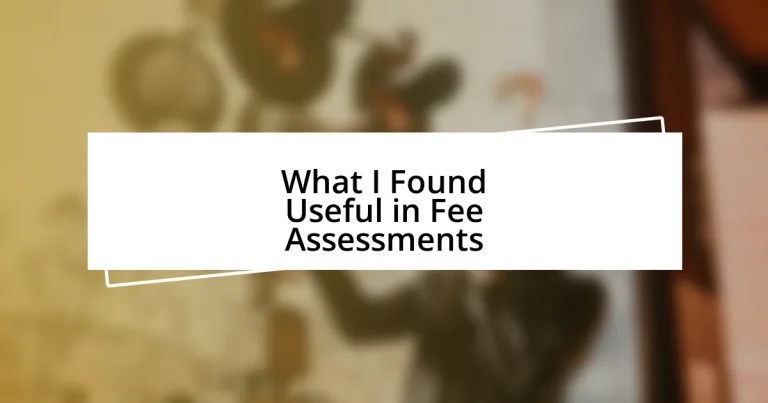Key takeaways:
- Understanding fee assessments and their impact can lead to more informed financial decisions and enhanced investment strategies.
- Accurate assessments foster transparency, trust, and the identification of potential cost savings, while inaccuracies can result in budget overruns and financial mismanagement.
- Utilizing tools, regular reviews, and engaging stakeholders in the assessment process can significantly improve fee management and increase the likelihood of uncovering hidden opportunities.
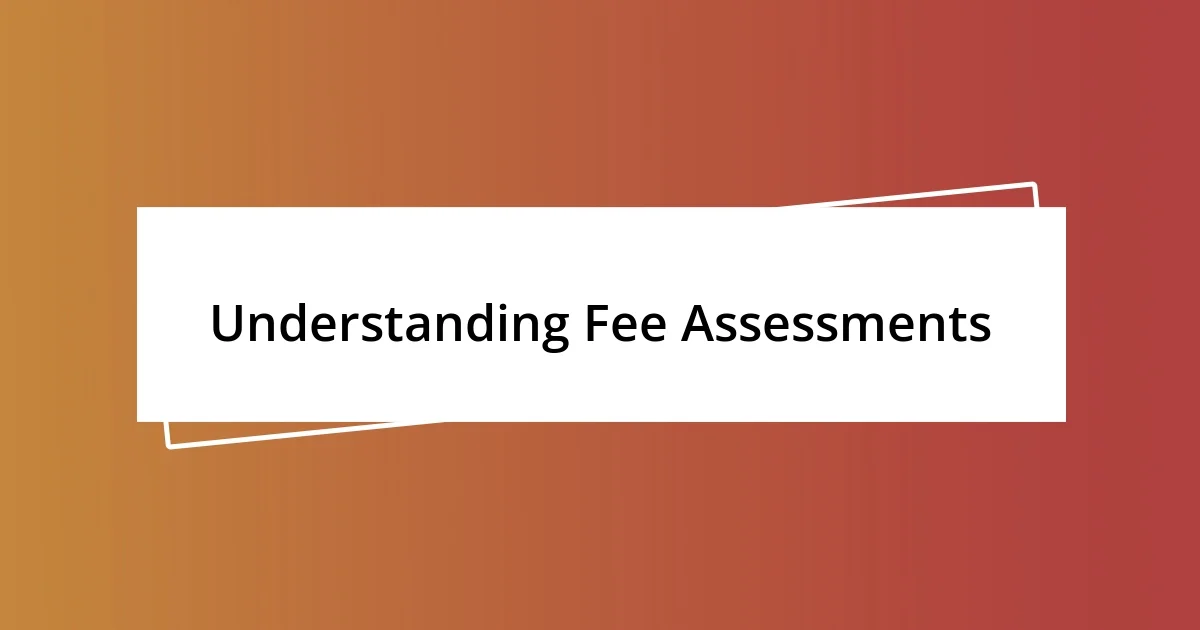
Understanding Fee Assessments
Navigating fee assessments can sometimes feel overwhelming. I remember the first time I encountered one; I was bombarded with terms and calculations that left me dizzy. It made me wonder: how many others are lost in the fine print?
Understanding fee assessments is essential for anyone involved in financial planning or budgeting. They can encompass various costs, from administrative fees to investment management expenses. I used to think these assessments were just another hurdle, but recognizing their purpose helped me see the bigger picture in my financial journey.
When I started analyzing my fee assessments, I found that even small differences in fees could lead to significant changes in my returns over time. Have you ever taken a close look at how fees impact your investments? It’s a little surprising how much clarity can come from simply understanding what’s being charged and why. This insight empowers you to make informed choices that align with your financial goals.
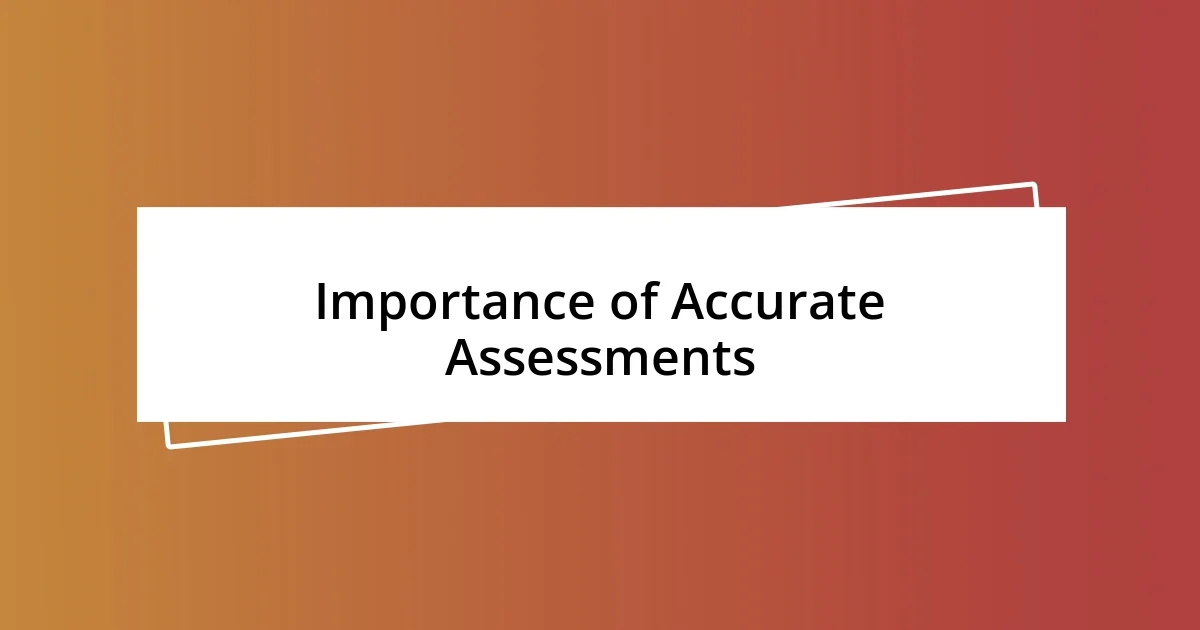
Importance of Accurate Assessments
Accurate assessments play a crucial role in ensuring that both individuals and organizations make informed decisions. I recall a time when an inaccurate fee assessment led me to overestimate my budget for a project. It was a stressful few days scrambling to adjust my plans, all because I didn’t have the right figures in front of me. This experience underscored how vital precise assessments are—one mistake can ripple into larger financial issues that affect not just the immediate task, but future endeavors.
When assessments are accurate, they promote transparency and build trust. I often think about how clarity in fee structures can enhance relationships between clients and service providers. The more transparent the assessment process, the more confidence I feel in the decisions being made. This idea rings especially true when I’ve experienced firsthand the peace of mind that comes from knowing my expenses are based on solid, reliable data.
Moreover, accurate assessments can significantly affect financial planning. In my journey, I’ve realized how critical it is to have reliable estimates to craft a sound financial strategy. Just last year, I meticulously reviewed my fee assessments, which allowed me to pinpoint areas for potential cost savings. This analysis ultimately led to a more robust investment strategy. Have you ever compared assessments to uncover hidden opportunities for maximizing your finances? It’s enlightening how clarity can shift your financial outlook.
| Accurate Assessments | Implications of Inaccuracy |
|---|---|
| Promotes informed decision-making | Can lead to budget overruns |
| Enhances trust between clients and providers | May cause discord and misunderstandings |
| Helps identify potential cost savings | Limits financial growth opportunities |
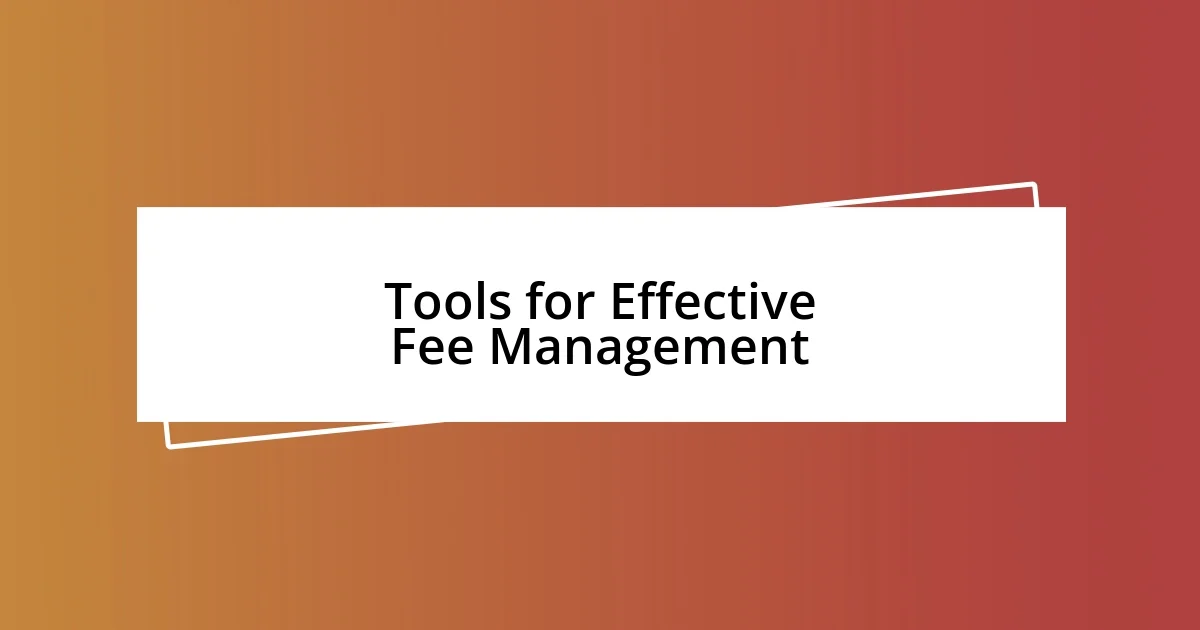
Tools for Effective Fee Management
Tools for Effective Fee Management
Managing fees effectively can feel daunting, but I’ve discovered some tools that truly make a difference. For instance, budgeting software has been a game-changer for me. Whenever I log my expenses, I can see exactly where my fees fit in, allowing me to quickly adjust my financial strategies. The ability to visualize my spending creates a sense of control.
Here are some tools that I’ve found particularly useful in managing fees:
- Budgeting Apps: Track and categorize expenses effortlessly.
- Fee Comparison Websites: Analyze and compare various service fees to identify the best options.
- Spreadsheet Software: Customize tracking of fees and budget adjustments.
- Financial Planning Tools: Help project future expenses based on current fee structures.
- Alerts and Notifications: Set up reminders for fee due dates to avoid late charges.
Leveraging these resources has empowered me to stay on top of my financial commitments. It’s a relief to manage fees proactively instead of reacting to unexpected charges.
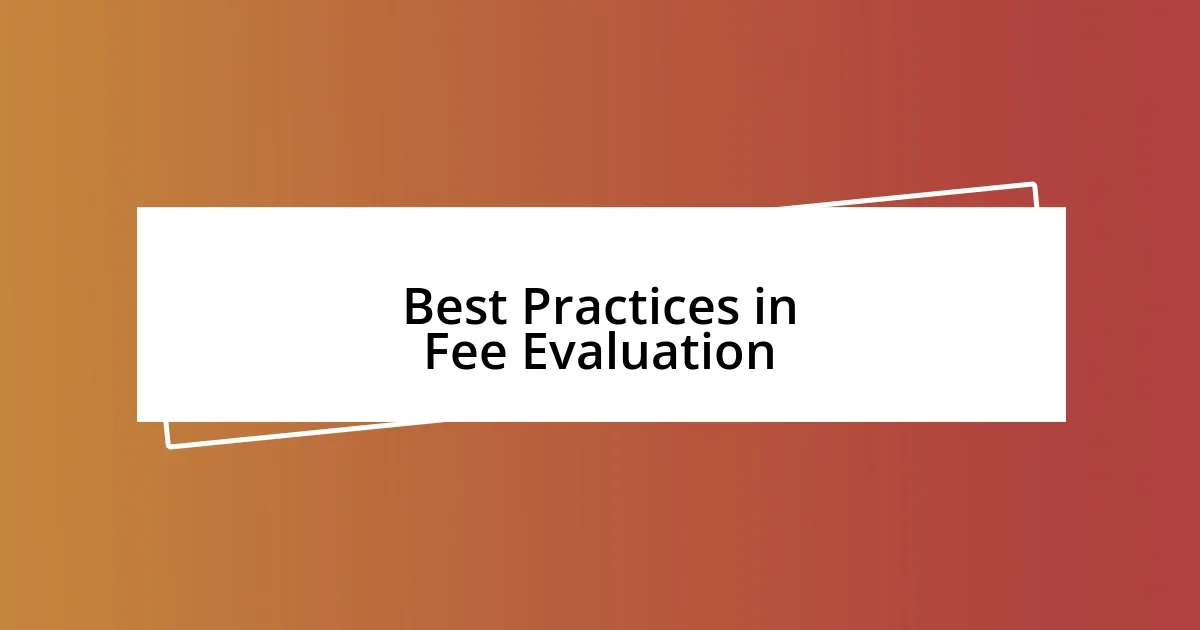
Best Practices in Fee Evaluation
When it comes to fee evaluations, one best practice that I’ve found invaluable is the importance of regular reviews. I remember a period where I took the time to reassess my expenses each quarter, and this practice revealed several areas where I was overspending. Discovering that I could switch providers for a service saved me a significant amount each month. Have you ever considered the hidden savings just waiting to be uncovered in your regular reviews?
Another effective strategy involves engaging stakeholders in the assessment process. Once, I organized a feedback session with team members about our fee structures. Their input brought forth perspectives I hadn’t considered, leading to adjustments that benefited everyone involved. This approach not only improved our financial decisions but also fostered a sense of collaboration. Isn’t it intriguing how sometimes it takes a team’s voice to unveil the best path forward?
Lastly, documentation plays a crucial role in ensuring transparency and accuracy in fee evaluations. I learned this the hard way while navigating a complex project with various fees involved. By meticulously documenting each charge and keeping detailed records, I was able to track discrepancies and rectify them before they became larger issues. Have you experienced the frustration of missing documentation? Clear records can do wonders in keeping your assessments accurate.
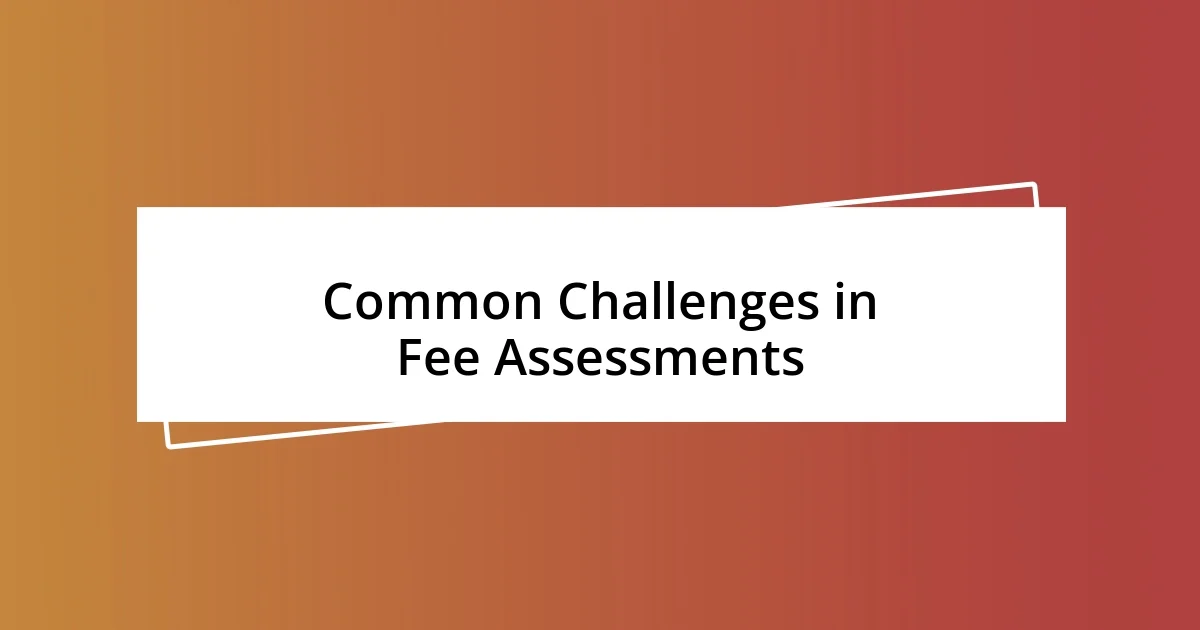
Common Challenges in Fee Assessments
One common challenge I’ve encountered in fee assessments is understanding the often convoluted fee structures presented by service providers. I once faced a situation where I couldn’t decipher whether a fee was a one-time charge or recurring. This confusion led to budgeting missteps that took me a while to sort out—have you found yourself in a similar predicament? It can feel frustrating, but becoming familiar with the common terminology helps immensely, and I’ve since learned to ask targeted questions upfront.
Another hurdle is the inconsistency in fee disclosures. There have been instances when I found myself comparing fees across different platforms, only to discover hidden charges that weren’t initially disclosed. This has made me realize just how crucial it is to ask for a full breakdown of all associated costs before committing to any service. Have you ever felt deceived by a fee that suddenly appeared? Knowing what to look for can shield you from those unpleasant surprises.
Finally, timing can significantly impact fee assessments. I remember a time when I hesitated too long on deciding to switch providers. In that pause, I ended up with an unexpected rate hike just before my renewal. It taught me a valuable lesson about the importance of being proactive in evaluating fees. Have you ever let a deadline slip away, only to regret it later? Staying ahead of the game is key to avoiding stress and ensuring you get the best deals possible.
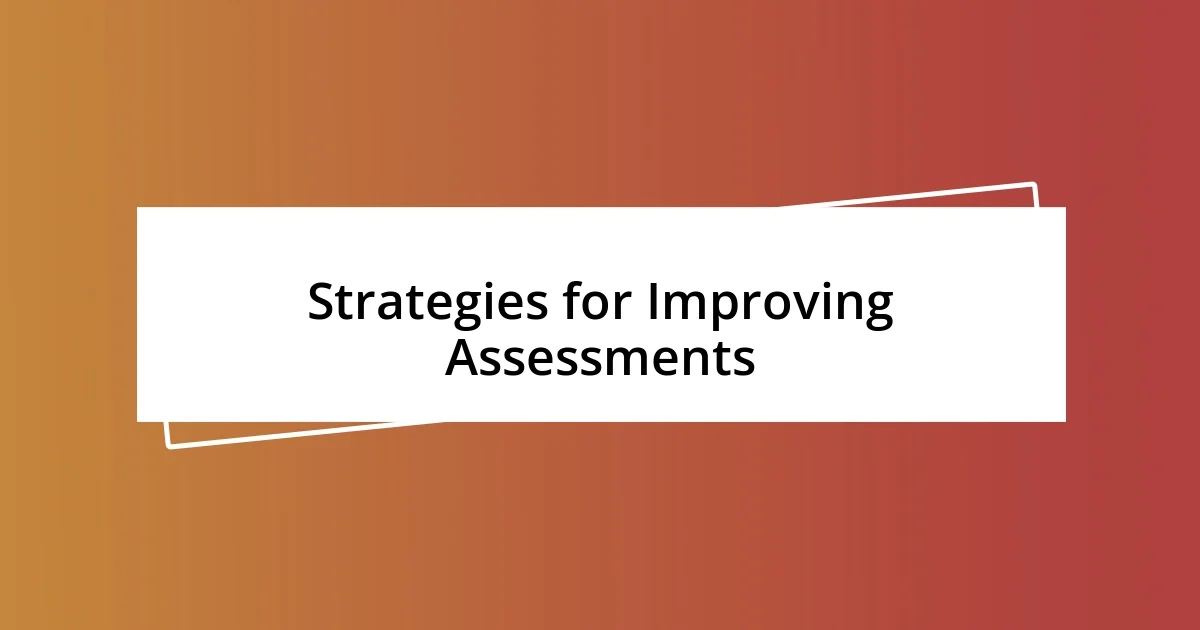
Strategies for Improving Assessments
To enhance the accuracy of fee assessments, I suggest implementing a systematic benchmarking process. I recall a time when I decided to invest a weekend comparing similar services and their associated fees. This exercise not only helped me identify the most cost-effective options but also revealed shocking discrepancies between what different providers charged for the same service. Have you ever thought about comparing apples to apples in your fee assessments? It can lead to enlightening discoveries that save you money.
Another strategy involves utilizing technology to streamline the assessment process. From my experience with budgeting apps, I found that automating the gathering of fee data significantly reduced the time spent on tracking. There’s something incredibly freeing about having everything in one digital space—no more digging through old emails or trying to remember who to call for clarifications. Isn’t it amazing how a simple tool can alleviate so much stress?
Finally, creating a feedback loop after each assessment can drive ongoing improvement. When I started gathering reflections from my team after each fee review, I was amazed at the wealth of insight they provided. Some suggestions were a bit of a surprise, but they often addressed issues I’d overlooked. Have you ever thought about how valuable collective feedback could be? By maintaining open lines of communication, you build a culture of continuous improvement and accountability.
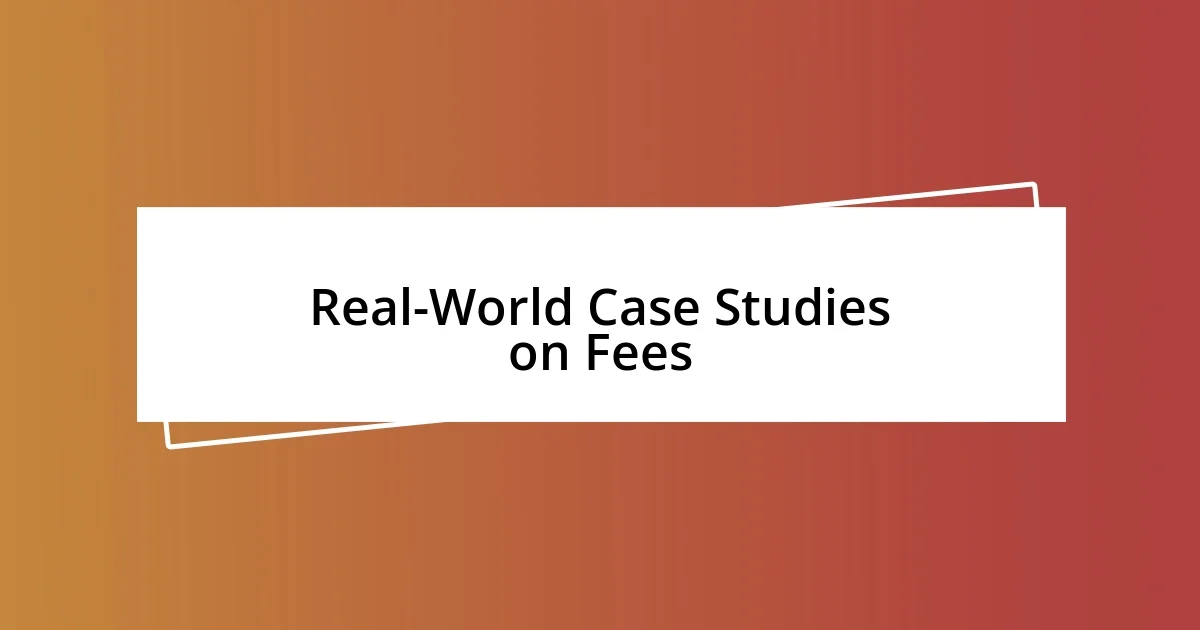
Real-World Case Studies on Fees
One case study that stands out to me involved a health insurance provider. I evaluated two different plans and was shocked to uncover a significant difference in out-of-pocket fees for the same medical services. While one plan advertised a lower monthly premium, the actual costs caught me off guard during a visit to my doctor. Have you ever experienced the frustration of realizing that the fine print changes everything? It reinforced for me the importance of digging deeper and analyzing all potential costs, not just the obvious ones.
Another vivid example comes from a close friend, who was assessing travel insurance for a family trip. Initially drawn to a company due to its competitive pricing, he discovered a plethora of extra fees that came into play when it was time to file a claim. I found it fascinating—and a bit alarming—that he felt more than just financial pressure; the whole experience tarnished what should have been a joyful vacation planning process. Have you ever felt the weight of unexpected fees ruin your excitement? This highlights how critically important it is to scrutinize the entire fee structure before committing to a service.
Lastly, a real estate transaction I observed emphasized the hidden costs associated with closing fees. One of my colleagues was shocked to find that the listing agent had included administrative fees that took a substantial bite out of the budget. While I wasn’t directly involved, it stuck with me—how often sellers and buyers overlook these fees as they focus on the sale price? I’m curious, have you ever overlooked a fee that later took you by surprise? Learning to question every line item can make a huge difference in ensuring that your financial expectations align with reality.












